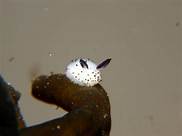Can Sea Bunnies Be Pets?
Sea bunnies, also known as Jorunna parva, are fascinating marine creatures that have captured the attention of many people. With their unique appearance, resembling a rabbit with its two long ears, and their ability to change color and texture, they have become popular subjects of discussion. One question that often arises is whether or not sea bunnies can be kept as pets.

Considerations Before Keeping a Sea Bunny as a Pet
There are several factors to consider before deciding to keep a sea bunny as a pet. These include:
- Habitat Requirements: Sea bunnies have specific habitat requirements, including the need for saltwater, a stable water temperature, and a diet of specific algae. Creating and maintaining a suitable environment for a sea bunny can be challenging and expensive.
- Dietary Needs: Sea bunnies have a specialized diet, primarily consisting of certain types of algae. Providing them with the right food can be difficult in captivity, as the availability and quality of the algae may vary.
- Stress and Sensitivity: Sea bunnies are sensitive creatures and can easily be stressed by changes in their environment or diet. Stress can lead to health problems and a shorter lifespan.
- Lifespan: Sea bunnies typically have a shorter lifespan compared to other pets, with some species living for only a few months.
Challenges of Keeping Sea Bunnies as Pets
In addition to the considerations mentioned above, there are several challenges associated with keeping sea bunnies as pets. These include:
- Availability: Sea bunnies are not commonly found in pet stores or through reputable breeders. Obtaining a sea bunny may require specialized knowledge and connections.
- Lack of Information: Compared to other popular pets, there is limited information available on the care and maintenance of sea bunnies in captivity. This can make it difficult to provide them with the proper care they need.
- Ethical Concerns: Some people argue that keeping sea bunnies as pets is unethical, as they are wild creatures that should not be taken from their natural habitat. Additionally, the demand for sea bunnies as pets can contribute to overcollection and harm to their populations.
Conclusion
While sea bunnies may appear fascinating and unique, they are not suitable pets for most individuals. Their specific habitat and dietary requirements, sensitivity to stress, and short lifespan make them challenging to care for. Additionally, the ethical concerns associated with keeping wild creatures in captivity should be considered. For those interested in observing these amazing creatures, it is best to do so in their natural habitat through responsible wildlife tourism or by visiting public aquariums.
Declaration: All article resources on this website, unless otherwise specified or labeled, are collected from online resources. If the content on this website infringes on the legitimate rights and interests of the original author, you can contact this website to delete it.






